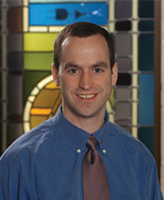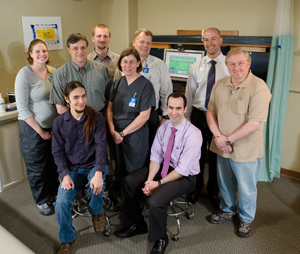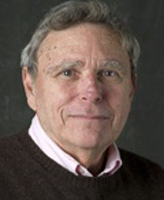University of Notre Dame engineer James Schmiedeler received the 2012 Rodney F. Ganey, Ph.D., Faculty Community-based Research Award for a project that uses the Nintendo Wii Fit platform to assist individuals dealing with weakness, paralysis, or impairments in balance and mobility as a result of strokes, accidents or illness.

The annual award from the University’s Center for Social Concerns honors a Notre Dame faculty member whose research has made a contribution in collaboration with a local community organization.
Schmiedeler, associate professor of aerospace and mechanical engineering, developed “WeHab” with colleagues from the College of Engineering and College of Arts and Letters, working in collaboration with the therapy staff at Memorial Hospital in South Bend. Already, more than 60 local individuals have benefited from this innovative, low-cost tool that provides biofeedback and data monitoring during balance therapy.
The WeHab system facilitates common rehab activities and measures patient performance in real time. In the clinic, it helps therapists improve rehab effectiveness and objectively assess patient progress without taking time away from rehab activities. Once patients go home, the low cost makes individual access affordable; the WeHab system can provide biofeedback during prescribed at-home activities and monitor patient compliance through progress reports.
“WeHab has the potential to revolutionize stroke therapy for patients, both in the clinic and at home,” says Schmiedeler’s Notre Dame colleague and co-investigator Charles R. Crowell, associate professor of psychology. “The utility of this technology may be extended to other rehabilitation domains involving orthopedic problems resulting from injuries, amputations or aging, applications that currently are being explored.”
According to Crowell, “Professor Schmiedeler’s groundbreaking work on WeHab has set the stage for a truly impactful and widespread rehabilitation service, not just for our local community, but also for communities all around the world.”

The results of the work are currently in use in Memorial Hospital’s inpatient and outpatient rehabilitation setting. As development progresses, the product will become available for private use clients and on a commercial basis, so other health care facilities will be able to use the application at their sites.
“I think the ability of WeHab to take rehabilitation into the patient’s home is most exciting,” says Dr. Johan Kuitse, director of rehabilitation services at Memorial. “As therapy visits become more limited due to payor restrictions and cost concerns, the need for effective home programs becomes more important.”
The Ganey Award is funded by local entrepreneur and philanthropist Rodney F. Ganey, and awarded by the Center for Social Concerns. The Center facilitates community-based learning, research and service for Notre Dame undergraduates, graduate students and faculty. Since 1983, more than 15,000 students and hundreds of faculty have been engaged in its courses, research and programs.
Several College of Arts and Letters faculty and students were among those recognized at the Center’s annual Ganey awards dinner this spring.

L. John Roos, a professor in the Department of Political Science and director of the College’s minor in Philosophy, Politics, and Economics, was presented with the Engaged Scholarship Award for “a lifetime of scholarship for social improvement.” Continuing a long history of community-based research and consulting, Roos and co-winner Karl King of South Bend recently completed an influential joint research report called Benchmarking South Bend.
Elizabeth Capdevielle, an assistant teaching professor in the University Writing Program, received a course development grant for The Rhetoric of Resilience: Sustainable Farming in the Community. Daniel Escher, a Ph.D. candidate in the Department of Sociology, received funding to develop a course called Energy, Social Life, and Civic Engagement.
Arts and Letters faculty and students were also involved in all three community research partnerships selected to receive Center for Social Concerns collaborative, community-based research mini-grants for 2012:
- Assessing the Impact of Head Start on Children and Families—Jennifer Burke Lefever, assistant professor in the Department of Psychology and associate director of the Center for Children and Families; Juan Carlos Guzman, Director of Research at the College’s Institute for Latino Studies; Autumn Wyant, Ph.D. candidate in the Department of Psychology; and Kathy Guajardo from the Head Start Consortium.
- Building Parent Involvement in South Bend—Rachel Parroquín, director of Spanish service-learning for the Department of Romance Languages and Literatures and the Center for Social Concerns; Ann Marie Power, director of undergraduate studies in the Department of Sociology; Notre Dame undergraduate students in a Spanish course called Language, Culture, and Community; Holy Cross Assistant Professor Carmen Macharaschwili; Holy Cross undergraduate students in a course called Building Family and Community Relationships; and Joyce Long from No Parent Left Behind, Inc.
- South Bend Neighborhoods and Prisoner Reentry—Edward Manier, professor emeritus in the Department of Philosophy and a faculty member in the History and Philosophy of Science Program; Debra Stanley, founder and director of UmaniUnidad; and returnee lead peer tutors Michael O’Neal, Ubaldo Sanchez, and Fred Teague.
Read more about each of the projects and winners here.
Learn More >
- Center for Social Concerns
- Rodney F. Ganey, Ph.D., Faculty Community-based Research Award
- Charles Crowell faculty page
- Michael Villano faculty page
- Department of Political Science
- Department of Psychology
- Department of Romance Languages and Literatures
- Department of Sociology
- Department of Philosophy
Originally published at newsinfo.nd.edu.


